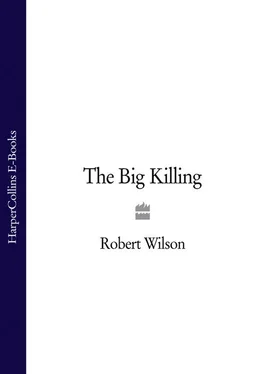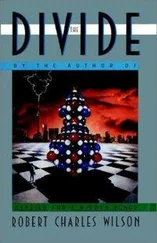1 ...6 7 8 10 11 12 ...16 Unlike Harold my objection was not to dying out here. The location wasn’t the problem. What did I care? Maybe Harold would rather belly up in the Piggly Wiggly car park in Fort Lauderdale. Me? I didn’t give a damn – as long as it wasn’t now. That was all I cared about.
My flesh was as chill as a fridged goose and the policeman’s eyes were thinning the hair on the back of my head. I started, several times, to think of Heike sitting in a Berlin café stirring coffee, waiting for someone, but I canned each one before I let myself slide into that particular darkness.
The rain eased off, the policeman got up, rolled his bin liner and left. The insects started up again. The barman blew out the candles in the bar. I went down to the car. My teeth itched. I looked for the policeman, but it was too dark to see anything in the weakening light from the closing bar.
With the headlights on I wiped off the number plates and altered two of the numbers with the black tape I’d brought with me. It was probably a pointless exercise now that I’d been seen at the drop point, but pointlessness seemed to be the night’s theme. Inside the car I removed the bulb from the interior light and rolled down the window.
I drove towards Abidjan breathing in the cool air full of the smell of wet earth from the pineapple plantation. I found the orange arrow and the track down to the lagoon. I rolled into the thick vegetation which covered the track dropping down to the bare, beaten earth in front of the jetty a few minutes after my 8.30 appointment. Large drops of water fell from the high trees as the tyres unstuck themselves from the mud.
The car skidded, as it came out of the trees, down on to the now puddled expanse of bare earth. My stomach lurched with it at the thought of trying to make it up the steep slope, at the other end of the clearing, if I needed to get away in a hurry.
The cone of light from the headlights was broken by the corner of another car. The radiator grille and mud-tread tyres belonged to a dark-coloured Toyota Land Cruiser. The paranoia kicked in. This was not the car driven by whoever had been watching me that afternoon. The dark saloon was still out there. I cut the headlights and the darkness shut down around us. If he was out there, he had to be close, because the night was black enough to have texture, so black that you knew that any light was inside your head.
I left the engine running and opened the door and, without getting out, shut it. I fixed my eyes on the patch of night where I knew the Land Cruiser’s windscreen was and waited, the car in gear, my foot cocked on the accelerator.
A superior lock clicked. A lozenge of yellow light appeared twenty-five yards away. In the barley-sugar glow, head thrown back and mouth open as if napping in a layby, was the driver, a white man. Moving fast out of the passenger seat an African’s head joined the night. His dark jacket, white shirt, black tie followed. A thin shaft of light, as solid as a blade, angled out. A white spot wobbled over the vegetation. The beam arced across the night sky, the white spot finding nothing out there, before it slashed through the blackness spearing my windscreen.
I dumped the clutch and picked up speed moving at an angle to the Land Cruiser, no headlights, using the cabin glow from the open Land Cruiser door to aim for where the African stood, a gun in one hand, the torch in the other. A shot – a crack of flame opened and closed. Then the torch was falling, my tyres slapping the puddles. The African’s empty left hand gripped the Land Cruiser’s roof rack. His right hand, still with the gun, pushed up off the door frame. His legs kicked up behind him. Another shot, another white line across the retina, and brown water burst in a puddle to my left. Then impact – the right corner of my car slammed the jeep’s door shut. The cabin blacked out. The Land Cruiser rocked. The man’s knees, elbows, toes and heels scrabbled across the roof rack. A body splashed in water. An engine howled.
I turned the headlight on. The track was a hundred metres away. The ground was troughed and shadowed with plateaux of light from the rain water. The car’s suspension panicked and jarred, the frame of the windscreen swerved and dipped. Different patches of trees held their leaves up against the light.
I hit the path and cut the headlights to sides only and eased my foot off the accelerator, still in first gear, the engine not screaming any more. Another shot cracked off. The car crawled up the slope. The front end slid right – the wheel, violent in my hands, snapped at my fingers. The tyres ripped over the slippery ruts of the track and caught on the drier central ridge but slid back and zipped in the mud. The car crabbed sideways and forward, the angle crazed, the tyres chewing at the road not catching, the body slewing and then rearing at the track’s edge. The rubber caught, the chassis lunged with the sound of gravel pockmarking the underseal. Another shot – the sound of ice cracking over a river and something with a sharp bite, like a horse fly, stung my neck. The car scrabbled like a desperate climber on a chute of scree. Another shot – the trees closer, my shoulders hunched forward, face up against the glass, the trees even closer but not in them yet, one more shot and then into the noise of the trees, the drops of water slapping and gonging on the metal. A warm trickle dropped below my collar, pooled in the clavicle hollow and ran down my chest.
I stabbed the headlights on, which lit the tunnel of vegetation leading out on to the flats of the pineapple plantation. The car baulked at the rain-filled troughs across the track. The shock absorbers did what they were paid to do. The displaced water shot off into the night with the sound of torn paper. My eyes flickered between the rectangles of mirror, waiting for headlights to appear.
The gully between the track and the graded road was flooded and I hit it at speed, the rain water pouring over the bonnet up to the windscreen. The car clawed its way up the bank as I lashed out at the wipers which swiped the screen in double time. Still no lights appeared in the mirrors. Steam poured out of the wheel arches and the engine faltered, leaving blank spaces in my chest. The fan belt screeched like a stuck pig as the car humped on to the road, the windscreen squeaking dry under the crazed wipers. The Peugeot gripped the road and I rallied through the gears back to Abidjan looking for lights, but the mirrors shone black all the way.
It was nearly eleven o’clock by the time I reached my room near Grand Bassam and the power was off. I flexed my fingers, still stiff from gripping the steering wheel, lit a hurricane lamp and drank from the neck of a bottle of Bell’s. I flopped under the mosquito net with it, and stared at the fan which hadn’t worked even with electricity.
My thoughts steadied in the yellow light which swayed lazily on the walls. I could see the Land Cruiser’s driver, the white man who was supposed to make the drop, not sleeping but dead. There was no blood on him but he was stretched back, stiff, a line across his neck, the garrotte tied around the seat’s head rest. The African I’d only seen for a second. His hair was close cropped and he had soft, rounded features with the light skin of a Métis which had shown three tribal cicatrices on the cheek dark against it.
I turned the lamp off and took a final suck on the bottle. My jaw began to loosen off and I went to sleep with Fat Paul where I didn’t want him – sitting heavily on my mind.
Monday 28th October
I woke up with a headache, a pain in the neck and a whisky bottle where a lover should have been. The sheets reeked. The room was already hot from the sun pouring through the unshuttered window and I had a film of sweat on my forehead and top lip. I felt a weight at the foot of the bed and started, but it was only Moses striking a maternal pose. I propped myself up on an elbow and saw the blood on the pillow. I kicked my way out of the mosquito net, Moses looking at me as if I might refuse to go to school.
Читать дальше












